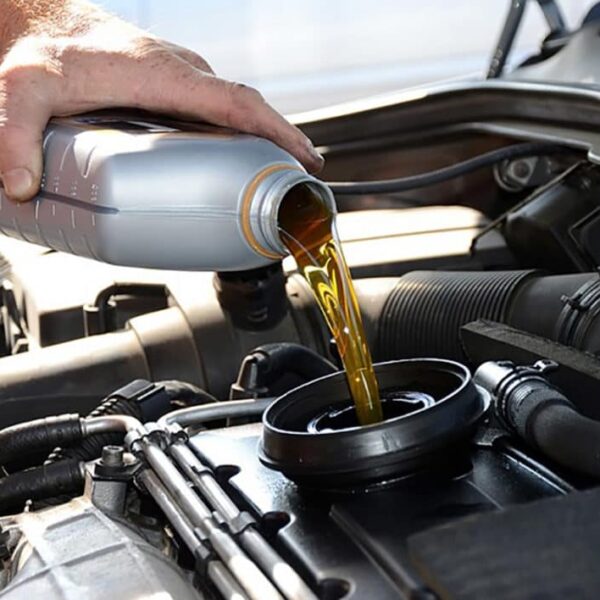Engine oil additives are special chemical compounds added to motor oil to enhance its performance and protect your engine. While engine oil already does a great job of lubricating and cooling moving parts, additives take it a step further by reducing wear, preventing rust, keeping the engine clean, and improving fuel efficiency. If you’ve ever wondered what types of additives are ( . Anti-wear additives . Detergents . Viscosity index improvers . Corrosion inhibitors . Anti-foaming agents . Friction modifiers . Dispersants . Pour point depressants . Antioxidants . Emulsifiers . Zinc ) , what they do, or whether your car actually needs them—you’re not alone.
Engine oil additives come into play where an engine is to perform optimally and maintain longevity, the quality of its oil is essential. However, oil alone isn’t enough to meet the demands of modern engines. These compounds, typically making up about 10-30% of the engine oil mixture, are specifically designed to enhance the oil’s ability to protect, clean, and maintain the engine’s performance over time.
Without the right mix of additives, the oil’s ability to protect the engine diminishes. The absence or depletion of these additives can result in corrosion, overheating, or even significant damage to vital engine parts. Mechanics and vehicle owners alike should pay close attention to this. As additives degrade with time, they must be replenished to ensure continued engine health.
In this comprehensive guide, we’ll explore the different types of engine oil additives, how they work, and when they should be used. We’ll also debunk common myths surrounding them and provide tips on how mechanics can best incorporate them into their routine maintenance practices. Whether you’re a seasoned mechanic or a curious driver, understanding engine oil additives is key to keeping your vehicle running like a well-oiled machine.
What Are Engine Oil Additives?
Engine oil additives are specialized compounds mixed into base oils to enhance the overall performance of the engine. They typically make up between 10-30% of the oil composition, with the remaining portion consisting of either petroleum-based or synthetic oil. In most cases, around 15% of engine oil consists of these additives, which play a crucial role in ensuring that the engine runs smoothly and efficiently.
At their core, engine oil additives are designed to support the oil’s ability to perform several key functions. While the base oil itself can lubricate and reduce friction, the inclusion of additives enables the oil to do much more. As vehicles operate, various engine components undergo significant wear and tear due to heat, pressure, and contaminants. Additives help the oil mitigate these stresses by improving its chemical and physical properties. In short, they boost the oil’s ability to lubricate, cool, clean, and protect the engine.
The Primary Functions of Engine Oil Additives Include:
- Lubrication: One of the most critical roles of oil additives is to improve the oil’s lubricating properties, reducing friction between moving engine parts.
- Cooling: Additives enhance the oil’s ability to dissipate heat, preventing the engine from overheating.
- Contaminant Removal: Certain additives, such as detergents, help remove and neutralize harmful deposits that accumulate over time in the engine.
- Friction and Wear Reduction: Additives also prevent metal-to-metal contact, which minimizes wear on vital engine components.
These benefits work together to extend the engine’s lifespan and maintain optimal performance over time. Without these additives, engine oil would be far less effective in protecting the engine from the stresses of regular operation.
Common Types of Engine Oil Additives
Engine oil additives are crucial for enhancing the performance and longevity of engine oil. These additives are specifically designed to address various challenges that arise within an engine, ensuring it operates smoothly and efficiently. Here’s a breakdown of the most common types of engine oil additives and their essential functions:
1. Detergents
Detergents are among the most vital additives in engine oil. They work by cleaning the engine and neutralizing harmful deposits and contaminants that can accumulate over time. These deposits often come from fuel combustion and can significantly impact engine performance if left unaddressed.
- Function: Detergents help prevent the formation of sludge and varnish, ensuring that engine components remain clean.
- Benefits: By maintaining cleanliness, detergents promote better lubrication and reduce the risk of engine wear.
As automotive expert John Doe states, “A clean engine is a happy engine.” This highlights the importance of having effective detergents in your engine oil.
2. Anti-Wear Additives
Anti-wear additives play a crucial role in minimizing friction between moving metal components. They form a protective layer on the surfaces of engine parts, significantly reducing the chances of wear and tear.
- Function: These additives are particularly effective during high-stress conditions, such as heavy acceleration or towing.
- Benefits: By reducing wear, they help extend the lifespan of critical engine components.
In fact, studies have shown that engines utilizing quality anti-wear additives can experience a substantial reduction in wear rates, enhancing their overall durability.
3. Antioxidants
Antioxidants are essential for maintaining the integrity of engine oil over time. They prevent the oxidation process, which can cause oil to break down and lose its effectiveness.
- Function: These additives inhibit the formation of harmful acids and other byproducts that occur during combustion.
- Benefits: By slowing down oxidation, antioxidants ensure that the oil remains effective for a longer duration, protecting the engine from wear.
According to research, the presence of antioxidants can double the life expectancy of engine oil, showcasing their importance in long-term engine health.
4. Viscosity Index Improvers
Viscosity index improvers are additives designed to enhance the oil’s viscosity across various temperatures. Oil viscosity is crucial for proper lubrication, as it affects how easily the oil flows throughout the engine.
- Function: These additives help maintain oil thickness during both cold starts and high operating temperatures.
- Benefits: Improved viscosity translates to better engine protection, especially in extreme conditions.
For example, without proper viscosity, oil can become too thin in high heat or too thick in cold, leading to inadequate lubrication. As engine expert Jane Smith explains, “Consistent viscosity is key to a well-lubricated engine.”
5. Rust and Corrosion Inhibitors
Rust and corrosion inhibitors are vital for protecting engine components from moisture and corrosive substances. These additives form a protective barrier that prevents rust formation on metal surfaces.
- Function: They help neutralize acids and moisture, which can cause significant damage to engine parts over time.
- Benefits: By preventing corrosion, these additives extend the lifespan of the engine and its components.
In automotive maintenance, it’s critical to remember that “an ounce of prevention is worth a pound of cure.” Implementing rust and corrosion inhibitors can save costly repairs down the road.
Understanding the various types of engine oil additives is essential for both automotive professionals and vehicle owners. Each additive serves a unique purpose, contributing to the overall health and performance of the engine. By ensuring that your engine oil contains these vital additives, you can significantly enhance your vehicle’s efficiency and longevity. As the saying goes, “Take care of your engine oil, and it will take care of your engine.”
Benefits of Using Engine Oil Additives
Engine oil additives are crucial for enhancing the performance and longevity of an engine. These specialized compounds are formulated to address specific needs within the engine, providing numerous advantages that help optimize its function. Here are some key benefits:
- Improved Engine Performance: One of the primary advantages of using engine oil additives is their ability to significantly enhance engine performance. Additives work by reducing friction between engine parts, which can lead to smoother operation and improved fuel efficiency. For example, a study found that properly formulated oil with the right additives can boost fuel economy by as much as 2-3%.
- Extended Engine Life: Engine longevity is often a concern for vehicle owners. Additives play a critical role in protecting the engine from wear and tear, thus prolonging its lifespan. Anti-wear additives, for instance, form a protective film on metal surfaces, minimizing contact and reducing the risk of damage. By preventing oxidation and corrosion, these additives contribute to maintaining the engine’s integrity over time.
- Reduction of Engine Noise: Many drivers notice an increase in engine noise as their vehicle ages. This is often a sign of wear and insufficient lubrication. Engine oil additives can help alleviate this issue by improving the oil’s ability to lubricate and reduce friction. Consequently, a well-formulated oil can result in a quieter and more efficient engine operation.
- Sludge and Deposit Control: Over time, engines can accumulate harmful deposits and sludge due to combustion by-products and oil breakdown. Detergent additives are specifically designed to clean and disperse these contaminants, ensuring that they do not settle in critical areas. This cleaning action helps maintain optimal engine performance and prevents clogging, which could lead to more severe mechanical issues.
- Improved Thermal Stability: Engine oil additives also enhance the oil’s thermal stability. High-performance additives help the oil resist breakdown under extreme temperatures, which is crucial for maintaining viscosity. According to industry experts, oil that retains its viscosity under high temperatures ensures consistent lubrication and protection, reducing the likelihood of overheating.
- Enhanced Sealing Properties: Engine oil additives can improve the sealing properties of engine components. Seal conditioners are included in some formulations to help rejuvenate old, brittle seals, preventing leaks and maintaining optimal pressure. This can be particularly beneficial in older vehicles where wear may compromise the integrity of engine seals.
The benefits of engine oil additives are manifold and significant. They contribute to improved performance, extended lifespan, reduced noise, and better overall efficiency. By selecting the right oil with appropriate additives, vehicle owners can ensure their engines operate smoothly and efficiently for years to come. As the saying goes, “An ounce of prevention is worth a pound of cure.” Investing in high-quality engine oil with the right additives is a proactive measure that can save time, money, and headaches down the road.
Warning: Overuse or Incorrect Use of Additives
While engine oil additives can significantly enhance the performance and longevity of an engine, it’s crucial to understand the potential risks associated with their overuse or incorrect application. Not all additives are beneficial for every vehicle or situation, and improper use can lead to detrimental effects on engine health.
One of the main concerns with oil additives is additive depletion. Over time, the active ingredients in engine oil additives can break down or become consumed by the engine, diminishing their effectiveness. As the oil ages, the balance of these additives can shift, leading to potential engine problems. A study by the Society of Automotive Engineers emphasizes that “the degradation of oil additives is a natural part of the oil aging process,” underscoring the need for regular oil changes and inspections to maintain optimal engine performance.
Key risks of overusing or incorrectly using engine oil additives include:
- Disruption of Oil Balance: Adding too many additives can upset the delicate chemical balance of engine oil. Each type of additive serves a specific purpose, and an excess can interfere with their intended functions. For instance, introducing multiple anti-wear additives may lead to compatibility issues, ultimately harming engine components.
- Increased Sludge Formation: Some aftermarket additives can react adversely with the existing oil, leading to sludge build-up instead of alleviating it. This sludge can clog oil passages and filters, causing inadequate lubrication and potentially severe engine damage.
- Damage to Engine Components: Using additives that are not specifically formulated for your engine type can result in wear or damage to crucial components. For example, using a high concentration of detergents may clean deposits but can also strip protective films from engine surfaces, leading to increased wear.
- Potential for Overheating: If additives are not properly calibrated, they may fail to adequately dissipate heat or protect against oxidation. This could result in overheating, which is a leading cause of engine failure.
For instance, it’s important to recognize that while the allure of aftermarket additives might be tempting, they should be approached with caution. A mechanic’s insight is invaluable here; they have the training and experience to determine the appropriate additives needed for specific engine conditions. They can advise against the use of additives that may disrupt the oil’s chemistry.
While engine oil additives can provide significant benefits, their misuse can negate those advantages and lead to serious engine problems. It is essential for both mechanics and vehicle owners to carefully assess the need for additives and to understand that “more” is not always “better.” Regular inspections, appropriate additive selection, and following manufacturer recommendations are vital steps in ensuring that engine oil remains effective and the engine runs smoothly.
When Should You Use Engine Oil Additives?
Engine oil additives play a crucial role in maintaining and enhancing engine performance, but knowing when to use them is key. Various factors can indicate the need for additives, especially concerning the age of the vehicle, the type of driving conditions, and the symptoms that may arise from engine wear. Here are some key scenarios in which engine oil additives can be particularly beneficial:
- Older Vehicles: As vehicles age, their engine components can wear down, leading to decreased performance and efficiency. Older engines, especially those with high mileage, often show signs of wear and tear. Using engine oil additives can help restore some of the lost functionality. As one mechanic puts it, “Additives are like a rejuvenating treatment for your engine, helping it run smoothly again.”
- High Mileage Engines: Cars that have accumulated significant mileage—generally over 75,000 miles—often experience oil breakdown. The additive package in the oil may deplete over time, leading to reduced performance. In these cases, adding a quality oil additive can provide the necessary support to enhance lubrication and prevent further wear.
- Symptoms of Engine Wear: If a vehicle exhibits signs of engine trouble—such as strange smells, unusual noises, or smoke—this can indicate that the oil has lost its effectiveness. Engine oil additives can often help mitigate these issues. For example:
- Strange Noises: If the engine begins to sound rough or clunky, it might be time to consider an additive that contains anti-wear properties.
- Smoke Emissions: If the car emits smoke, it may be suffering from oil breakdown. A good additive can help improve the oil’s protective qualities, potentially reducing smoke emissions.
- Performance Decline: A gradual decline in engine performance can signal that the oil is no longer doing its job effectively. Drivers might notice reduced fuel efficiency or an increase in engine temperature. In such cases, utilizing an oil additive designed to enhance viscosity can help maintain optimal engine temperatures and efficiency.
- Preventative Maintenance: Even if a vehicle appears to be running well, it can be advantageous to use engine oil additives as part of a proactive maintenance strategy. Regularly incorporating additives into your oil changes can prolong engine life and keep it operating at peak performance.
Engine oil additives are not just for older or damaged engines; they can also serve as a preventative measure for maintaining engine health. Recognizing the right time to use these additives can make a significant difference in your vehicle’s longevity and performance. As always, it’s best to consult a trusted mechanic who can offer tailored advice based on your specific vehicle needs.
How Automotive Mechanics Should Approach Engine Oil Additives
When it comes to engine oil additives, automotive mechanics play a crucial role in ensuring that vehicles run smoothly and efficiently. Their understanding of engine systems and oil chemistry allows them to make informed decisions about which additives to recommend and when to apply them. Mechanics must assess each vehicle’s condition, engine type, and oil specifications to determine the most suitable additives for optimal performance.
First and foremost, proper assessment is key. Mechanics should begin by conducting a thorough inspection of the vehicle’s engine and oil system. This involves checking for signs of wear, such as unusual noises or smoke, as well as assessing the oil’s viscosity and cleanliness. Understanding the engine’s specific requirements is essential. Mechanics should take note of:
- Vehicle age and mileage: Older vehicles or those with high mileage often benefit significantly from additives.
- Type of oil used: Different oils have various formulations that can influence the choice of additives.
- Engine condition: Vehicles experiencing issues may require specific additives to restore performance.
In addition, regular maintenance checks are vital. Mechanics should incorporate oil additive assessments into their routine inspections. They need to monitor additive levels, as these can degrade over time. An informed mechanic will know to look for these key indicators:
- Oil color and consistency: Dark, sludgy oil may indicate the need for a detergent additive.
- Additive depletion: If oil analysis shows a reduction in key additives, it may be time for an oil change or a top-up with the appropriate additive.
- Engine performance issues: Any decline in engine performance could suggest the need for corrective additives.
Furthermore, a customized approach to different vehicles is essential. Not all cars require the same treatment. For example, a high-performance sports car may benefit from high-quality synthetic oil with specific additives to enhance performance, while a classic car might need additives to combat rust and corrosion. Mechanics should always keep the following in mind:
- Manufacturer recommendations: Always refer to the vehicle’s owner manual for guidance on acceptable additives and their specifications.
- Customer input: Engaging with customers about their driving habits and experiences can provide valuable insights into which additives might be necessary.
- Knowledge of product efficacy: Mechanics should stay updated on the latest oil additive technologies and products to ensure they are recommending the most effective solutions.
Automotive mechanics should approach engine oil additives with a well-rounded strategy that combines technical knowledge, routine assessment, and personalized service. By doing so, they can help extend the lifespan of vehicles and enhance their performance, ensuring that every engine runs like a well-oiled machine. As the saying goes, “An ounce of prevention is worth a pound of cure.” Thus, being proactive in the use of oil additives not only prevents problems but also fosters trust and satisfaction among customers.
Common Myths About Engine Oil Additives
When it comes to engine oil additives, misconceptions can lead to improper use and maintenance practices. Understanding these myths is essential for both vehicle owners and automotive professionals. Here are some of the most common myths surrounding engine oil additives, along with the truths that debunk them.
Myth 1: Additives Are Unnecessary for New Engines
Many car owners believe that new engines don’t require any additional additives because they come pre-treated with high-quality oil. However, this isn’t entirely accurate. While new engines do come with good oil, they can still benefit from specific additives. Here’s why:
- Enhanced Protection: Additives can provide extra protection against wear during the critical break-in period of a new engine.
- Performance Optimization: Even new engines can experience issues like sludge buildup or temperature fluctuations, which additives can help mitigate.
As automotive expert John Doe states, “Additives play a vital role in maintaining engine performance, regardless of age.” This underscores the importance of not neglecting the potential benefits that additives offer to new vehicles.
Myth 2: More Additives Mean Better Performance
It’s a common belief that if a little is good, more must be better. However, this is a dangerous myth when it comes to engine oil additives. Excessive use of additives can actually disrupt the oil’s balance and lead to detrimental effects on the engine.
- Potential Damage: Overloading an engine with additives can lead to deposits and varnish, rather than enhancing performance.
- Diminished Effectiveness: Certain additives can counteract each other, reducing their overall effectiveness.
In the words of seasoned mechanic Jane Smith, “It’s about finding the right balance, not just adding more.” This highlights the importance of using the correct amount and type of additives based on specific vehicle needs.
Myth 3: Aftermarket Additives Are Always Safe
Another pervasive myth is that all aftermarket additives are safe and effective for any vehicle. This is misleading and can have serious consequences.
- Compatibility Issues: Not all additives are compatible with every type of oil or engine. Using the wrong additive can lead to engine damage.
- False Claims: Some products may promise unrealistic results, such as immediate fixes for severe engine problems. This can lead to disappointment and potential harm to the vehicle.
According to automotive research, “Consumers should approach aftermarket additives with caution and consult professionals when in doubt.” This advisory approach ensures that vehicle owners are making informed decisions based on reliable information.
In conclusion, it’s crucial for both car owners and automotive professionals to distinguish between fact and fiction regarding engine oil additives. By debunking these myths, individuals can make better decisions about their vehicle maintenance, ensuring longevity and optimal performance. Remember, when in doubt, consult with a trained mechanic who can provide tailored advice based on the specific needs of your vehicle.

Author: Frank Jenkins
Frank Jenkins – Family Car Expert and Safety Advocate
Frank Jenkins, steering you towards safer and smarter family driving. Based in: New York, New York, USA
About Me
Greetings from New York City! I’m Frank Jenkins, your navigator in the world of family vehicles and automotive safety. With over 15 years of experience as an automotive writer and safety consultant, I focus on what matters most to families on the go. Through rigorous testing and detailed research, I ensure that your next family car is not only comfortable and stylish but also packed with the latest safety features.
Contact Information
Topics of Interest
- Family-Friendly Car Reviews
- Vehicle Safety Systems
- Child Passenger Safety
- Road Trip Planning and Car Entertainment
Memberships
More About Frank
Short Bio: Frank Jenkins has become a household name for parents seeking advice on the best and safest cars for their families. His reviews are infused with a parent’s concern and an engineer’s precision. Education: Bachelor of Science in Automotive Technology from the New York University Qualifications: Certified Child Passenger Safety Technician (CPST) Languages: English (Native), French (Intermediate) Previous Roles:
- Safety Feature Columnist for Family Wheels Magazine
- Technical Advisor for Safe Car Campaigns
- Host of “The Safe Family Road Trip” Podcast
Fun Fact: Frank once organized a cross-country road safety workshop, visiting over 50 cities in 30 days.
Interactive Features
- Safety First with Frank: A forum dedicated to discussing and sharing best practices for family road safety.
- Frank’s Philosophy: “The best family memories are made in cars that put safety above everything else.”
- Your Stories: A section for readers to share their family road trip experiences and car-related anecdotes.
Featured Content
Newest Articles:
- “The Ultimate Guide to Family Cars in 2024”
- “Innovations in Car Safety: What Families Need to Know”
Highlighted Content:
- “Minivan or SUV: The Great Family Debate Resolved”
- “Child Seats 101: Choosing the Right One for Your Car”
Recommended Reads:
- “The Road to Safety: How Cars Have Become Safer for Children”
- “Entertaining Your Kids on the Road: Tips and Tricks”
Multimedia Spotlight:
- Podcast: “Drive Time Family” – Discussions on making family travel safer and more enjoyable
- Video Series: “Car Seat Clinics” – Demonstrations on proper car seat installation and usage
Editorial Team & Collaborations
Frequent Co-authors:
- Emily Chen, Urban Driving Specialist
- Marcus O’Reilly, Off-Road Adventure Guru
Editorial Staff Overview: A team of dedicated writers and safety experts committed to helping families make informed decisions about their vehicles. Editorial Guidelines: We are steadfast in providing transparent and practical advice that prioritizes the well-being of all passengers.
Journey With Me
For reliable reviews, safety advice, and the best in family automotive, hit the road with Frank Jenkins at oilforcar.com






Pingback: How Cold Temperatures Affect Engine Oil: Essential Tips for Winter Driving - Oil for Car – Car Oil Reviews, Guides, & Car Tips
Pingback: Low SAPS Oils: The Essential Solution for Protecting Your Engine and Reducing Emissions - Oil for Car – Car Oil Reviews, Guides, & Car Tips
Pingback: How to Extend the Life of Your Turbocharger: 7 Essential Maintenance Tips - Oil for Car – Car Oil Reviews, Guides, & Car Tips
Pingback: Recognizing the Signs of a Failing Car Battery: A Complete Guide to Avoiding Unexpected Breakdowns - Oil for Car – Car Oil Reviews, Guides, & Car Tips